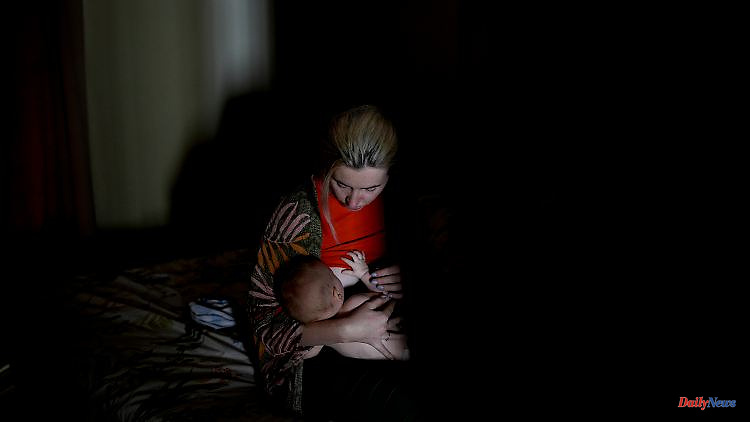For the past six months, Argentinian authorities have been observing how pregnant Russian women enter the country and then give birth every day. Many fly away afterwards. Is there a mafia at work? The judiciary is dealing with it, even the US authorities are asking about it. Some of the women are afraid.
New Year begins with excitement for Tatyana. The 36-year-old picks up her luggage and her cat, leaves her large condominium in central Moscow, drives to the airport, boards a plane to Istanbul and from there flies across West Africa and the southern Atlantic to Buenos Aires. Tatjana is visibly pregnant. When she shows her passport to the border guards at the airport, more Russians stand in line, with children and pets, after which they get vacuum cleaners, bicycles and even cooking pots from the baggage carousel.
Tatjana has a different name, but wants to remain anonymous for fear of possible consequences. The lawyer is just one of many thousands of pregnant Russian women who have traveled to Buenos Aires as tourists to give birth. Last year there were 10,777 women and a total of 22,200 Russians, authorities say. This year there will probably be a lot more. In January alone, more than 4,500 Russian women came to the country, four times as many as in January before the war began in Ukraine. In the streets, parks and cafes of Buenos Aires, Russian can be heard more and more often from young families.
Tatjana's baby is due to be born soon. "We were vehemently against the war from day one," she explains, explaining the motivation for the two to flee months later. She became pregnant in the summer of 2022, and on September 21, Putin announced partial mobilization for the fighting in Ukraine. "Within three hours we made the decision to fly to Argentina," she says. Europe was too expensive. Her husband, a 31-year-old software developer in training, left immediately. She took care of the papers and followed on New Year's. "We wanted to have a baby without the risk of my husband being drafted."
The two are just two of hundreds of thousands of Russians who have left their homeland since partial mobilization. Already in October it should have been up to 700,000. In Argentina, some public hospitals have now put up signs in Russian. They are part of a state health system for the population that does not have comprehensive insurance and cannot afford to go to private clinics. Nobody gets turned away. However, as a matter of principle, Tatyana and her husband do not want to take advantage of this, they say. So they pay $4,500 to a private clinic with an English-speaking doctor for care and delivery. They had to scrape together the money.
There are a number of groups in Messenger Telegram where interested people can exchange information in Russian about a future flight or their new life. "Birth in Argentina" is the name of one with more than 5,000 members. Among them is Tatyana. She has come to a country of immigration and a historic destination for people from Europe. Whoever is born here also receives citizenship. Parents can apply for permanent residency and then get a passport themselves without having to give up their existing one. But during a raid in the chic Puerto Madero district, investigators found fake permanent residence permits in an apartment. This was supposed to be used to steal passes.
When border officials at Buenos Aires International Airport noticed the unusually large number of pregnant Russian women handing them their passports last year, they began systematically questioning the women. In the more than 350 interviews, some said they paid for interpreters, assistance at the clinic, future residence permit applications, and passports. One of the agencies offering these services is called "RuArgentina". She advertises with a penguin holding a baby sling in its beak like a stork - along with an Argentine passport. A single consultation starts at 100 US dollars, the all-round care "first class" including a residence permit costs at least 15,000 US dollars.
Most Russians arriving are married and mostly affluent professionals who telecommute in finance and digital industries or live off their savings. According to the immigration authorities, pregnancy is irrelevant to whether someone is granted entry as a tourist. There is also no special visa in case a woman wants to give birth in the country. As if the officers were waving the women through like everyone else.
The authority has now transferred the case to the judiciary, which is investigating in the background because of the formation of Mafia-like associations. The accusation: A large number of them are only concerned with getting a passport, which are considered to be extremely travel-friendly, but do not want to live in the country. The authorities are concerned that the document will be misused and that other countries could restrict the entry options for almost 46 million Argentines.
Of the 22,200 Russians who entered the country last year, many left again, including 6,400 women. Only 2400 applied for a residence permit. Instead, many tried to get a passport directly. "They are not interested in citizenship to live here," says Florencia Carignano, head of the immigration service. "They come to have babies." The agency "RuArgentina" advertises that holders of an Argentine ID card do not need a travel visa in 170 countries around the world. The owner has already publicly defended himself against the criticism: he is offering a completely legal service. So far, a few dozen of the Russian women who have entered the country have received permanent residence permits, not a single one with citizenship or a passport.
It is currently not easy for one of the translators who accompany pregnant Russian women. Born in Russia, she lived in Ukraine for a long time and emigrated to Argentina years ago. However, she does not want to talk about her work in order to rule out any consequences. "The women are afraid," she explains her refusal: "They don't want to be interviewed or named." This probably also has something to do with the Argentine government, which, due to ongoing investigations, is not commenting on what could threaten whom.
The US Department of Homeland Security has since contacted an Argentine federal court, which is investigating the case. We are interested in the results. Argentine passport holders can obtain US residency visas for up to 10 years. According to the head of the Argentine Ministry of Justice, the request from the USA shows the "concern" about the events. The Department of Homeland Security believes it could become important to US immigration officials.
Tatjana and her husband are irritated, and at times frustrated, by the sudden attention paid to themselves and other Russians. They intend to stay in the country for at least three years: "We really like it here. We have never encountered any hostilities." According to Argentine authorities, they are a minority. The two want to apply for a passport for their child and then for citizenship. They have already started learning Spanish in a language school. They could also have gone to Turkey or Southeast Asia. But here, 13,500 kilometers from their homeland, they feel closer to Europe.












